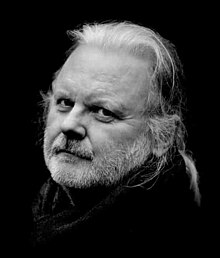Jon Fosse | |
|---|---|
 | |
| Born | Jon Olav Fosse 29 September 1959 Haugesund, Rogaland, Norway |
| Occupation |
|
| Education | University of Bergen (BA) |
| Literary movement | Minimalism |
| Notable awards | Nobel Prize in Literature (2023) |
| Spouse |
|
| Children | 6 |
Jon Olav Fosse (Norwegian: [ˈjʊ̀nː ˈfɔ̂sːə]; born 29 September 1959) is a Norwegian author, translator, and playwright. In 2023, he was awarded the Nobel Prize in Literature "for his innovative plays and prose which give voice to the unsayable."
Fosse's work spans over seventy novels, poems, children's books, essays, and theatre plays, which have been translated into over fifty languages.[1] The most performed Norwegian playwright after Henrik Ibsen,[2] Fosse is currently—with productions presented on over a thousand stages worldwide—one of the most performed contemporary playwrights globally.[3][4] His minimalist and deeply introspective plays, with language often bordering on lyrical prose and poetry,[5][6] have been noted to represent a modern continuation of the dramatic tradition established by Henrik Ibsen in the 19th century.[5][7] Fosse's work has often been placed within the tradition of post-dramatic theatre, while several of his notable novels have been described as belonging to the style of post-modernist and avant-garde literature, due to their minimalism, lyricism and unorthodox use of syntax.[8][9]
- ^ Frank Johnsen/Bergens Tidende: -Eg skriv aldri sjølvbiografisk – Intervju med Jon Fosse – Aftenposten 4. november 2020
- ^ Cite error: The named reference
nrkwas invoked but never defined (see the help page). - ^ "Jon Fosse".
- ^ NRK (19 August 2005). "Jon Fosse – «take it or leave it»". NRK (in Norwegian Bokmål). Retrieved 5 October 2023.
- ^ a b Drangsholt, Janne Stigen; Rottem, Øystein; Surén, Odd Wilhelm; Allkunne (5 October 2023), "Jon Fosse", Store norske leksikon (in Norwegian), retrieved 5 October 2023
- ^ "«Nokon kjem til å kome»: Mørk meditasjon over ensomheten". Dagsavisen (in Norwegian). 10 September 2019. Retrieved 5 October 2023.
- ^ H.H. Andersson, Jon Fosse i teaterhistorien, kunstinstitusjonen og markedet, University of Oslo, 2003
- ^ Bordemann, Suzanne (26 March 2012). "«Man må føre menneskeheten ut av fryktens og den tålmodige sløvhetens primitive stadier» – Om den tyskspråklige resepsjonen av Jon Fosses tidlige dramatikk". Norsk Litteraturvitenskapelig Tidsskrift. 1 (in Norwegian). 15: 46–59. doi:10.18261/ISSN1504-288X-2012-01-04. ISSN 0809-2044. Retrieved 5 October 2023.
Både Fosses teater og postdramatiske teateruttrykk utfordrer representasjonsteaterets normer og konvensjoner ved å rette søkelyset mot selve persepsjonsprosessen. Når dramatiske konstituenter dekonstrueres, oppstår gjerne kollisjoner med rådende estetiske normer i teaterkritikken. Jeg skal gi noen eksempler på dette.
- ^ "Hva er det med Jon Fosse?". www.bt.no (in Norwegian Bokmål). 8 May 2005. Retrieved 5 October 2023.